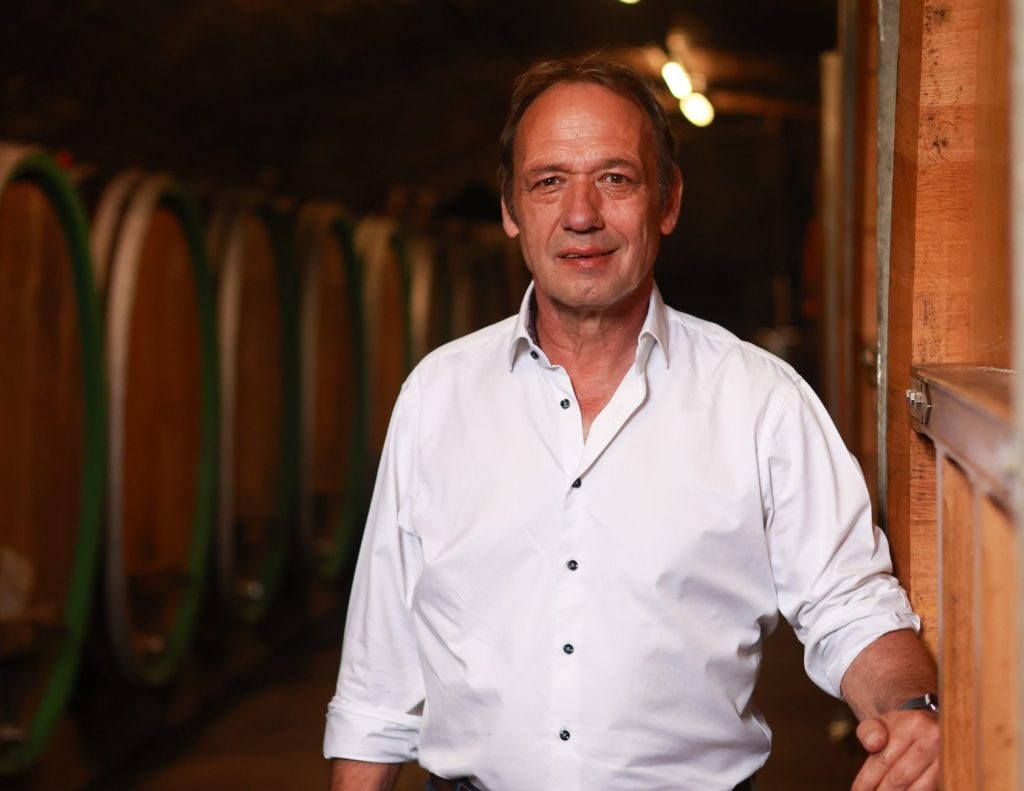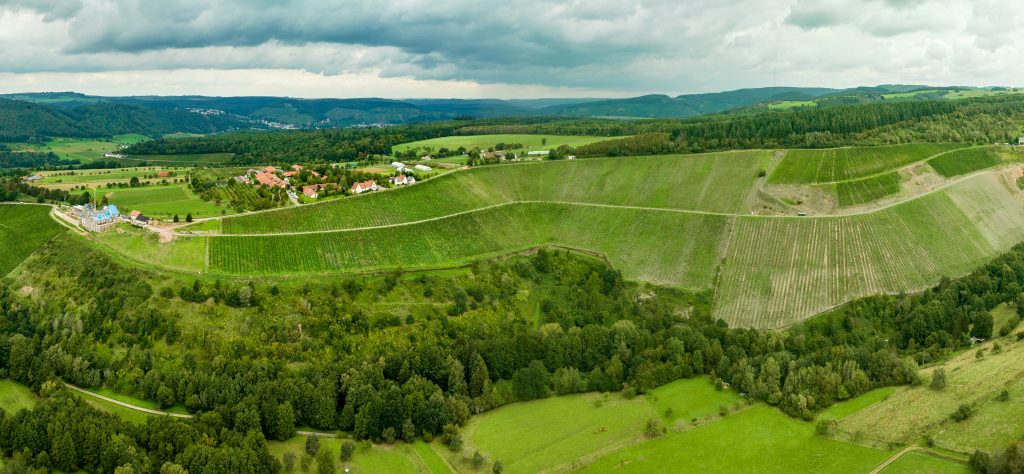This website uses cookies so that we can provide you with the best user experience possible. Cookie information is stored in your browser and performs functions such as recognising you when you return to our website and helping our team to understand which sections of the website you find most interesting and useful.
Markus Molitor brings Domäne Serrig to La Place
Markus Molitor has brought two wines from his iconic single-vineyard in the Saar valley, Domäne Serrig, to La Place, making it the first German winery to release all of its production on the French distribution system. Bordeaux correspondent, Colin Hay gets a sneak preview and first tasting of the exciting new wines.

The 14 November something very special will happen. For we will see the first German winery to release all of its production on La Place de Bordeaux. And what a release it is, with Markus Molitor bringing two wines from his iconic single-vineyard in the Saar valley, Domäne Serrig, to La Place.
The wines come from the vertiginous slopes of the Vogelsang monopole. This former Prussian state-owned property was established by Emperor Wilhelm II in 1904. It served as an example of best practice viticulture for the Saar region until it went into decline, along with many other German state domains, by the 1970s and was eventually privatised at the end of the 1980s. The potential of its singular and exceptional terroir remained largely unfulfilled.
The key date in its rejuvenation is 2016, with the estate’s acquisition by Markus Molitor. Since then, a remarkable transformation has been underway, led personally by Markus Molitor. That will culminate on the 14 November with the first release of wines from the estate – the Vogelsang Grosse Lage and the Vogelsang Kabinett, both from the 2020 vintage. La place de Bordeaux will commercialise both wines throughout the entire world.
Domäne Serrig’s courtier on La Place is the renowned Excellence Vin. The two wines will be offered by a négociant pool of 18 of La Place’s leading hors Bordeaux stars: Barrière Frères, Crus et Domaines de France, C.V.B.G, Maison Descaves, DIVA, Dubos, Duclot, Jean-Pierre Moueix, Joanne Rare Wines, L.D.Vins, Louis Vialard, Maison Ginestet, Roland Coiffe, Maison Sichel, Sovex, Twins, Ulysse Cazabonne and Veyret Latour.

What is perhaps more exciting still is that Domäne Serrig remains very much a work in progress. The the estate buildings and wine-making facility are in the process of modernisation and reconstruction. And at present only 5 hectares of old-vine Riesling are in production. The other 20 hectares have been restructured and re-replanted since 2017, entirely with high quality Riesling massal-selections. The two wines to be released are to be marketed under the historic single-vineyard name Vogelsang – itself a monopole, which emerged from bringing the original Vogelsang and Heiligenborn vineyards together. The terroir is incredible, with a gradient of between 40 and 100 per cent and a south to southwestern exposure on red-tinted slate that rises from 220 to 340 meters above sea level.
In a vineyard of this kind there is, of course, the possibility to produce further cuvées. But, as Markus Molitor’s export director, Daniel Kiowski explained to me, that is not really the aim here. With Weingut Markus Molitor’s other vineyards producing almost 100 different wines from around 95 hectares, there is much to be said for the simplicity of releasing just two fabulous wines from a great terroir of 25 hectares (above all, with 20 of the 25 hectares still to enter into production).
The first vintage to be released is the 2020. Whilst the total production of each wine is currently in the region of 12,000 bottles, around 10 per cent will be retained by the property to build a library stock and a further 15 per cent will be held back for private customers visiting the property once it open to be public. The 2021 vintage is likely to be released – again, via La Place – in the September 2024 hors Bordeaux campaign, whilst the 2017 and 2019 vintages will be released at a later date.
I was lucky enough to taste these wines with Weingut Markus Molitor’s export director, Daniel Kiowski.
Tasting notes

Domäne Serrig Vogelsang Kabinett (Markus Molitor) 2020 (100% Riesling; from a legendary estate established by Kaiser Wilhelm II in 1904 on the incredibly steep slate slopes of the Saar river valley; 10.5% alcohol). 1st release and exclusively via La Place de Bordeaux. Basket pressed and vinified in a combination of oak barrels and stainless steel (though with essentially no residual impression of oak in the profile of the wine). Bright, fresh, bitingly zingy with lots of grapefruit pith and zest, gooseberry, a subtle hint of flinty-stony minerality, nettles, sage and wild oregano. Radiant and ultra-juicy on the astonishingly vivid attack, but then with a fabulous energising release of ripples and rivulets of concentrated citrus sapidity. Quite saline on the finish, accentuating the chiselled and gently tapering contours of this sublime wine. A lovely little touch of tannin too. Incredible. I really love the purity, precision and yet amazing intensity. 97+.
Domäne Serrig Vogelsang Grosse Lage (Markus Molitor) 2020 (100% Riesling; from a grand cru vineyard in the Saar; from a legendary estate built by Kaiser Wilhelm II in 1904 on the incredibly steep slate slopes of the Saar river valley; 10 g/l of residual sugar, acidity of 8 g/l; 12% alcohol). 1st release and exclusively via la place de Bordeaux. A little fuller in colour with a hint of gold alongside the Kabinett’s silver highlights. Wow. Richer, more profound, yet more complex and with spicier and waxier notes alongside the flintstone, slate and whetstone minerality. Yuzu, white grapefruit, white currant, mandarin and assorted confit and preserved citrus notes, saffron too. I love the wild herbal undertones – again, oregano but joined here by lemon thyme, marjoram and a hint of verbena too. The intensity on the attack is utterly amazing and it takes a moment to hone in on it – it comes as a shock that you can’t quite prepare yourself for, even as you return to the glass. So incredibly tense and intense, almost a little fore-square and with the parameters and extremities of the pure dense compact block of fruit that is at the centre of this outlined by the most gracious and tender of gentle tannins. Wondrously vibrant, explosively dynamic and alive, charged with energy and a brilliant crystallinity. 10 g/l of residual sugar that is entirely imperceptible (the citrus intensity is so great here that one might be forgiven for thinking the residual sugar were higher in the Kabinett). Quite simply brilliant and utterly unique. Eternal on the finish – the vanishing point is well over the next horizon! One of the most exciting wines I have tasted in recent years. I have goosepimples all over; a wine to heighten one’s senses. 100.
Related news
A 'challenging yet surprising' vintage for Centre-Loire in 2024

